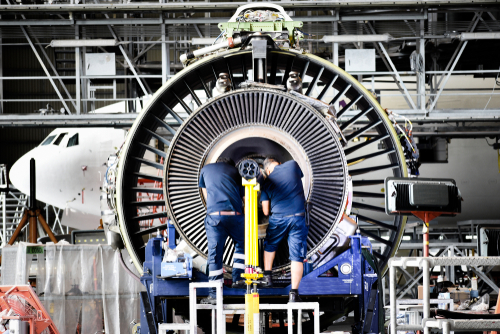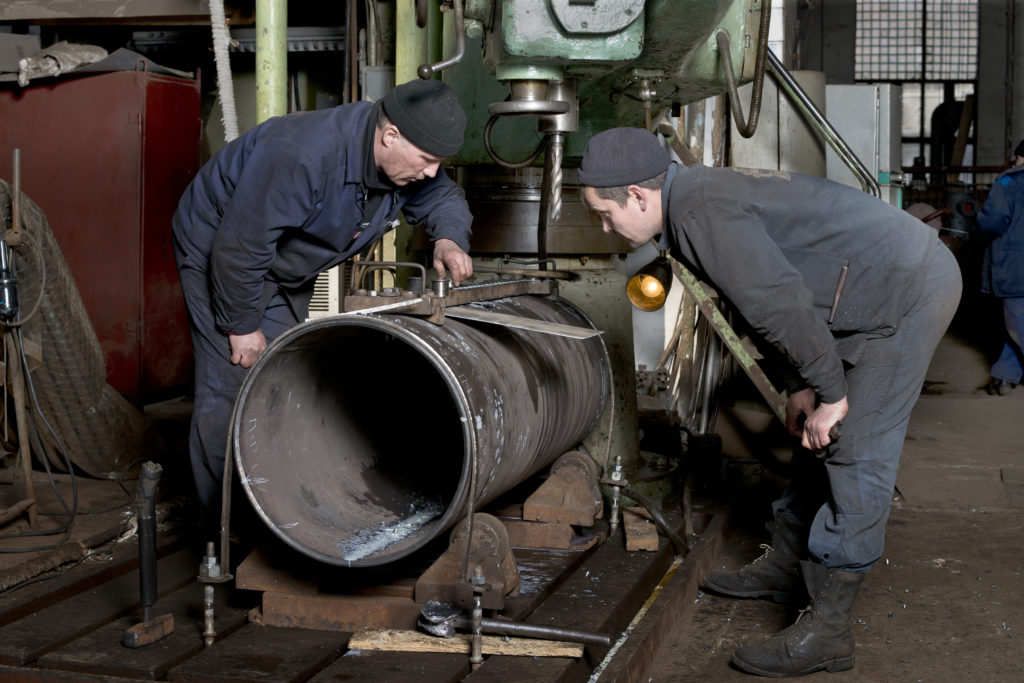The price of college sky-high and many degrees not earning as well as they used to. People are beginning to take a closer look at the trades when considering their professional future. Trades are attractive for many reasons. You learn the job while doing the work as an apprentice, and get paid. In some cases this is much better than racking up tens of thousands in college debt.
But there are other reasons to consider trades as well. You can’t outsource trades to cheaper countries like you can with manufacturing. Trades are more recession-proof than many industries, including:
- service industries
- retail
- many sectors of the business and finance world
Trades pay as well as, or better than, many careers that require a degree. The trades are also full of opportunities for people who want to start their own business eventually. Many people prefer to work with their hands and do a job that makes a real, immediate, physical difference in the world, as opposed to sitting behind a desk.
There is an increased interest in these essential jobs. So we decided to put together this ranking of the highest paying trades. We feature some of the best choices for those of you who are asking, “What are the highest paying trades?” We’ve also included answers to a few common questions at the end of the article to help you get started. Here is our list of the highest paying skilled trades.
1. Construction Manager
Construction manager comes in first on our list of highest paying trades. It should be noted that there are construction management degree programs at both the associate and bachelor’s degree levels. These are often not required to become a construction manager. Experience is the most prized attribute of a candidate for construction management. However, these programs might not be a bad idea if you want to develop certain skills that aren’t as easy to acquire on the job site.
Most construction management jobs require a variety of construction experience in the area of the contractor’s specialty. The range of experience depends on the scope of the job and the size of the contracting company. Big contractors looking for managers to oversee multiple job sites tend to want people with 8-10 years of experience in various areas of construction. Positions with less responsibility typically require 4-8 years of experience. Once you have some good experience in construction, a construction management degree can set you apart. It can help you score some of the best, highest paying jobs with the biggest firms.
Median Salary: $95,260
Top 10% Salary: $164,790
Projected 10-year Job Growth: 8%
Projected Number of New Jobs: +40,400
2. Elevator/Escalator Mechanic
Elevator/escalator mechanics is second on our list of the highest paying skilled trades. Elevator/escalator mechanics install, repair, and maintain elevators and escalators. The most common way to become an elevator mechanic is to apprentice as one. Then follow the apprentice to journeyman to master path. There are some educational programs that can help you get started in these highest paying trades. They can make you more attractive to people who want an apprentice who already knows their way around.
Keep in mind that elevator mechanics need to be very comfortable working in small, cramped spaces and at great heights.
Median Salary: $84,990
Top 10% Salary: $124,150
Projected 10-year Job Growth: 7%
Projected Number of New Jobs: +1,900
3. Aircraft and Avionics Equipment Mechanic/Technician
There are three primary ways people become aircraft mechanics. The first is through on-the-job training. Simply start at the bottom and work your way up as you learn more. There are various requirements that vary from state to state, and FAA requirements that must be met.
The second is to attend an initial FAA-approved training program at a college or trade school.
The third is through training in the military. Aircraft mechanics tend to work:
- in hangars
- repair stations
- on airfields
You should be comfortable working:
- with, in, and around heavy equipment
- potentially high-pressure situations
- lots of noise.
Median Salary: $64,310
Top 10% Salary: $101,070
Projected 10-year Job Growth: 5%
Projected Number of New Jobs: 7,300
4. Construction and Building Inspector
Most states require construction and building inspectors to be licensed or certified. Most inspectors have experience in construction trades like:
- plumbing
- electrical
- general construction
- HVAC-R
The job, one of the highest paying skilled trades, normally requires intensive on-the-job training, but not a degree. Inspectors may work alone or on a team. You may have to crawl into tight spaces and climb up on ladders to get a good look at certain areas of a building. Inspectors must have a strong knowledge of:
- state and local building codes
- ordinances
- zoning regulations
You must be able to determine whether structures meet the obligations of a given contract.
Median Salary: $60,710
Top 10% Salary: $98,820
Projected 10-year Job Growth: 3%
Projected Number of New Jobs: 3,900
5. Electrician
These days every building has:
- electrical wiring
- communications
- lighting
- control systems
This means every building needs electricians to maintain and repair those systems. And every building that gets built needs electricians to install those systems.
You can attend a technical school for some initial training. But to actually become an electrician you will have to follow the traditional apprentice to journeyman to master model. This is common in most of these highest paying skilled trades. An electrical apprenticeship typically takes four to five years, working 40-hour weeks under a journeyman or master electrician. It’s also common for them to attend classes one night per week, often through their trade union or a local technical school.
Median Salary: $56,180
Top 10% Salary: $96,580
Projected 10-year Job Growth: 8%
Projected Number of New Jobs: +62,200
6. Plumber
Plumbers primarily handle the installation and repair of water and gas lines. Most people think of plumbers as the guy they call to fix a leaky pipe or other problem in their house. But there’s a lot of work out there for plumbers besides just home repair. It definitely makes our list of the highest paying skilled trades. Plumbers also work on:
- new construction
- retrofits
- many other kinds of projects
Any new building will need water and/or gas lines installed.
Plumbers don’t go to school to become plumbers. They learn on the job, as with many traditional trades. They start out as apprentices. They shadow a master plumber and work with them on jobs. They learn the ins and outs of the trade. Once they are ready, they can pursue licensure and become a journeyman plumber. For the most part, journeyman plumbers can work without supervision, often with partners. To become a master plumber, a journeyman must:
- log a certain amount of hours
- provide proof of experience
- take an exam
Requirements vary from state to state.
Median Salary: $55,160
Top 10% Salary: $97,170+
Projected 10-year Job Growth: 4%
Projected Number of New Jobs: +20,900
7. Boilermaker
Boilermakers tend to find their highest paying jobs working with contractors in:
- plumbing
- heating
- air-conditioning
They also work:
- in nonresidential building construction
- in utility system construction
- for a variety of different kinds of contractors
The work can require extended periods of travel as boilermakers go where the worksites are. Boilermakers install and maintain:
- boilers
- tanks
- closed vats
These devices generate electrical power or provide heat to buildings and ships. You can make good money as a boilermaker. But it’s not the most common trade and may be difficult to find an apprenticeship. Still, it makes our list as we sort through what are the highest paying trades.
Median Salary: $63,100
Top 10% Salary: $94,440
Projected 10-year Job Growth: 1%
Projected Number of New Jobs: +100
8. Wind Turbine Technician
This is an incredibly fast-growing trade as countries strive to reduce their reliance on fossil fuels for energy. It wouldn’t be surprising to see the median salary rise as demand for wind turbine technicians skyrockets. The most common way to become a windtech is to attend a technical or trade school followed by long-term on the job training. Wind turbine technicians must be okay with working:
- at great heights
- outdoors
- in confined spaces
Demand for windtechs will vary location to location. Not every climate is suitable for wind energy. Some regions are quicker to adopt the new technology than others. If you want to get in on the ground floor of a new trade that will see increased importance in the future, this is a great choice.
Median Salary: $52,910
Top 10% Salary: $80,150
Projected 10-year Job Growth: 61%
Projected Number of New Jobs: +4,300
9. HVAC-R Technician
HVAC-R stands for:
- heating
- ventilation
- air conditioning
- refrigeration
In the United States every one of these will need HVAC-R systems:
- home
- school
- hospital
- office building
- factory
The two main ways into the trade are through apprenticeship, or an associate or bachelor’s degree program. Some states require licensure while others may not. Licensure requirements will vary from state to state. Working conditions will often be unpleasant. It will be either very hot or very cold, as generally the HVAC-R mechanic is there to fix a broken climate control system.
You should also be okay with working in spaces that are:
- confined
- uncomfortable
- often dirty or unkempt.
Median Salary: $48,730
Top 10% Salary: $77,920
Projected 10-year Job Growth: 4%
Projected Number of New Jobs: +15,100
10. Solar Photovoltaic Installer
This is another trade that will be increasingly essential in the future. It’s poised to experience rapid growth within the next 10 years. While it may not pay as much as other trades right now, this may also change. Demand increases as we convert to green energy. Getting in on the ground floor means you will have more opportunities as you gain experience and the industry grows. In the future you could find yourself starting your own business, or even working with major up and coming green energy companies.
Installations are typically done outdoors, and high up on rooftops. Consider this trade only if you’re okay working in a variety of somewhat uncomfortable or dangerous conditions. Some solar photovoltaic installers take courses. Many just learn the trade on the job after they complete their high school diploma.
Median Salary: $44,892
Top 10% Salary: $63,880
Projected 10-year Job Growth: 51%
Projected Number of New Jobs: 6,100
Frequently Asked Questions
Do I need to attend a trade school to go into a trade?
It depends on the trade. Some trades benefit from trade school. Often newer trades may require it, as there might not be enough masters in the trade for an apprenticeship model to be feasible. In the case of most trades, attending a trade school won’t hurt. But what you have to decide is whether you want to spend that extra time in trade school when you could be doing your apprenticeship. Trade school, for the most part, won’t let you jump ahead or skip your apprenticeship in most trades.
If you are still in high school and have the option to attend a vocational high school, that can be a great choice. They often give you a chance to try out a bunch of different kinds of trades to see what you like and are good at. It’s also sometimes possible to begin an apprenticeship part-time or during summers while still in high school.
What are some advantages trades have over other careers?
It’s a common misconception that trades take somehow less training or experience than other careers in order to be successful. Most apprenticeships last about five years. That’s a year longer than it takes to earn a bachelor’s degree on average!
There are some significant advantages though. First, many trades pay the same or even much better than careers that require a bachelor’s, or even a master’s degree! Second, while apprentices don’t make as much money as journeymen or masters, they do get paid for their full-time labor. This means you get the advantage of making money while you’re learning. You can be making money the whole time and come out ahead.
On top of that, most trades are guaranteed to be useful long into the future. Even when recessions happen and the economy is in bad shape, people and companies will still need their homes and buildings repaired.
Once you have enough experience and save enough money, you can easily start your own business if you want. Trades are one of the only sectors in which there aren’t many major corporations beating out small businesses.
What trade should I choose?
Well, that’s not an easy question to answer. This ranking of the top ten highest paying trades features well-established, time-honored trades. They will always be necessary and always pay well. But it also features a couple newer trades. The wind turbine mechanic and solar panel installation trades aren’t guaranteed to pay as well in the future as some trades do now. However, they represent a great opportunity to get involved in the ground floor of new technology. These become increasingly relevant to our society in the future. This means there might be more opportunities for starting up businesses if entrepreneurship is something you’re interested in.
Then you have to consider your own preferences and interests. If you’re afraid of heights, elevator mechanic may not be the job for you. If you don’t like lots of loud noises, you might not want to work on a construction site or an airfield. If you have a hard time with confined spaces, you might not want to be a plumber or electrician.
How do I find an apprenticeship?
The first step is to ask the trade union locals in your area. Often they will run apprenticeship programs for their members that place apprentices. This gives you a chance to work with multiple organizations in the area. If your trade has a union you will want to be a part of it eventually anyway, so you may as well start there for advice. They can tell you the best way to go about pursuing an apprenticeship in your region.
GCD Staff
November 2020
Related:
- Top 50 Great Deals on Bachelor’s Degrees Online
- Top 10 Highest Paying Business Degrees 2021
- 20 Highest Paying Bachelor Degrees









